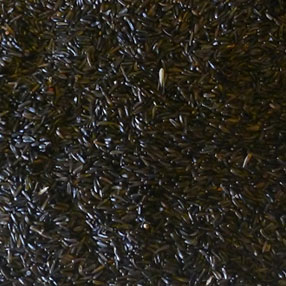

Niger Seeds

Niger(Nyjer) Seeds which comes from the Ramtili plant and scientifically known as Guizotia abyssinica. Oil enriched, black and small Ingurgitated with oils. Niger Seeds are mainly used to feed the birds and it also marginal used in India as jelly.
Though Ethiopia still exports Niger Seeds but today India secures a significant position as one of the Niger Seed Exporters and produces around 2 Lakh tones Nyjer seeds and 75% (approx) of the produced Niger seed are exported to U.S. Niger Seed Exporters of India also export high quality seeds to Mexico, Singapore, Canada, EU and Brazil.
The seed, technically a fruit called an achene, is often sold as birdseed as it is a favourite of finches, especially the Goldfinch and the Greenfinch. In the birdseed market, Nyjer is often sold or referred to as thistle seed. This is a misnomer resulting from early marketing of the seed as “thistle” to take advantage of the finches’ preference for thistle.
History
In 1982 the USDA ordered that imported niger seed must be heat sterilized to kill the contaminant dodder seed. This treatment, however, was insufficient to kill seeds of other Federal noxious weeds, including Asphodelus fistulosus (onion weed), Digitaria spp. (includes African couchgrass), Oryza spp. (red rice), Paspalum scrobiculatum (kodo millet), Prosopis spp. (includes mesquites), Solanum viarum (tropical soda apple), Striga spp. (witchweed), and Urochloa panicoides (liver-seed grass). In 2001 a new treatment required that imported niger seed must be heat treated at 120 °C (248 °F) for 15 minutes.
In 2002 the “EarlyBird” variety of Guizotia abyssinica with a crop maturity of 65 days was developed and adapted to grow in the United States. The “EarlyBird” variety of Guizotia abyssinica is protected by U.S.D.A. Plant Variety Protection Certificate Number 9900412. A second variety of Guizotia abyssinica submitted to the U.S.D.A. for Plant Variety Protection called “Earlybird 50” has a crop maturity of 50 days and is a shorter, more dense plant with a higher yield and is less susceptible to lodging than the “EarlyBird” variety. Both varieties have short enough maturities to make production feasible in many U.S. growing regions. Guizotia abyssinica is not a Federal noxious weed and is now in commercial agricultural production in the United States often grown as a first or second crop before or after wheat, corn, soybeans, and cucurbits. Niger is self-sterile and requires bees for cross pollination.
Niger seeds are also used in southern parts of India. In Karnataka, Andhra Pradesh and Maharashtra, Niger seeds (called valisalu/valasulu, uchellu/gurellu and Karale in Telugu, Kannada and Marathi respectively) are used to make a dry chutney which is used as an accompaniment with breads. They are also used as a spice in some curries.
